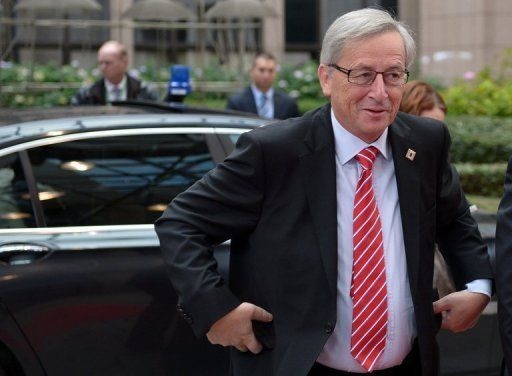Eurozone to meet on Greek aid, debt accord extension

Luxembourg Prime Minister Jean-Claude Juncker is the head of the eurozone finance ministers' group
At the same time, the ministers are looking at a Greek request for the terms of its bailout to be extended by two years to 2016, allowing it to spread out the pain of the tough austerity measures it has agreed to in return for help.
The problem, however, is that an extension could add up to 30 billion euros ($39 billion) to an already huge bailout bill, making it a contentious and difficult option at best.
A spokesman for the head of the eurozone finance ministers' group, Jean-Claude Juncker, said Friday that they would hold a conference call on Wednesday.
"For the moment, no other meetings have been arranged," the spokesman added.
European sources meanwhile said they did not expect any final decision to be taken Wednesday but added that it would depend on what was accomplished on Monday by a Euro Working Group of senior eurozone officials.
"We should be able to see better after that," one of the sources said.
German Finance Minister Wolfgang Schaeuble meanwhile put the issue bluntly on Friday.
"We want Greece to stay in the eurozone. But Greece has a lot of things to do. That has not yet been decided.
"There are doubts over whether Greece has fulfilled its commitments up until now. These doubts must be dispelled in the future," Schaeuble said.
Monday's meeting will review Greek progress on its bailout economic targets to see if it has finally met terms that allow payment of the next, crucial aid tranche worth 31.5 billion euros ($40.7 billion).
Greek Prime Minister Antonis Samaras has been trying to persuade his coalition allies to accept new austerity measures to close that deal but they have baulked at labour reforms demanded by the 'troika' of creditors.
Without the aid payment, Samaras has warned, the country could be broke by the middle of next month.
Monday's meeting will also look at Greece's request to extend the length of its debt rescue's terms as the country spends a sixth year deep in recession.
Greece obtained an EU-IMF bailout of 110 billion euros in 2010 but had to go back again in 2011, agreeing a deal which included 130 billion euros in new aid and more than 100 billion euros in a radical write-down of government debt held by private creditors.
"The debate is focused on the extension but the first step is the confirmation by the troika (the EU, International Monetary Fund and European Central Bank) that the aid payment can be made," one European source said.
The cost of an extension for Greece would be "between 20 and 30 billion euros ... On the extension, things are moving but we must establish the cost involved and how it would be financed," another source said.
Such a sum would be "a new cost and a new political problem but 20 billion euros, when put in context, it is not catastrophic but it is politically difficult," the source added.
The source said the eurozone would not agree to another restructuring of Greek debt nor give it a new loan.
As for cutting the interest rate charged on the rescue loans, that was difficult because other bailed-out countries -- so far Ireland and Portugal -- would demand the same, the source said.
Another problem is that Greece, with the programme extended, could miss the key target of reducing its total debt to 120 percent of Gross Domestic Product by 2020, a point the IMF is very focused on.
Next week's meetings come as the Eurogroup prepares for a formal gathering on November 12 when Greece will likely top the agenda with Spain, which at one point looked as if it too would need a bailout, close behind.
What the stars mean:
★ Poor ★ ★ Promising ★★★ Good ★★★★ Very good ★★★★★ Exceptional
Related Contents
Latest News
More News
- Russian President congratulates Vietnamese Party leader during phone talks (January 25, 2026 | 09:58)
- Worldwide congratulations underscore confidence in Vietnam’s 14th Party Congress (January 23, 2026 | 09:02)
- Political parties, organisations, int’l friends send congratulations to 14th National Party Congress (January 22, 2026 | 09:33)
- 14th National Party Congress: Japanese media highlight Vietnam’s growth targets (January 21, 2026 | 09:46)
- 14th National Party Congress: Driving force for Vietnam to continue renewal, innovation, breakthroughs (January 21, 2026 | 09:42)
- Vietnam remains spiritual support for progressive forces: Colombian party leader (January 21, 2026 | 08:00)
- Int'l media provides large coverage of 14th National Party Congress's first working day (January 20, 2026 | 09:09)
- Vietnamese firms win top honours at ASEAN Digital Awards (January 16, 2026 | 16:45)
- ASEAN Digital Ministers' Meeting opens in Hanoi (January 15, 2026 | 15:33)
- ASEAN economies move up the global chip value chain (December 09, 2025 | 13:32)

 Tag:
Tag:




















 Mobile Version
Mobile Version